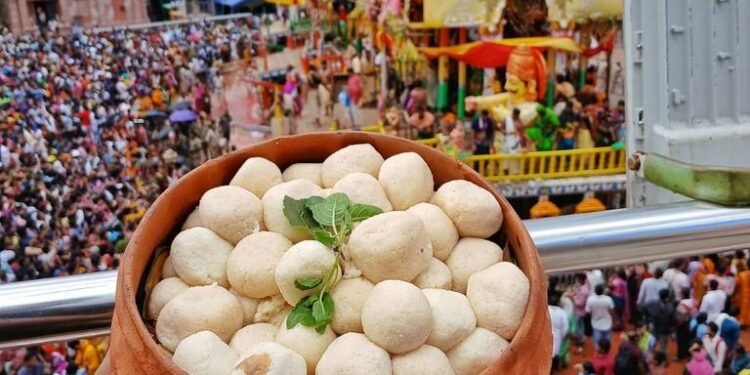Puri- Odisha today celebrated Rasagola Dibasa with heartfelt devotion and cultural pride, reaffirming the deep-rooted legacy of its iconic sweet, the ‘Odisha Rasagola’. More than just a dessert, this beloved delicacy carries sacred significance, symbolising divine reconciliation and centuries-old tradition within Jagannath culture.
The festival is intricately tied to the sacred ritual of Niladri Bije, the concluding day of the grand Rath Yatra in Puri. On this day, Lord Jagannath returns to the sanctum sanctorum of the Shree Jagannath Temple and offers rasagolas to Goddess Lakshmi as an act of appeasement, rekindling their celestial bond. This ritual not only illustrates the role of food in spiritual traditions but also conveys a deeper message of love, forgiveness, and relationship harmony.
Rasagola Dibasa first emerged in 2015 as a people-led initiative to assert Odisha’s historical claim over the origin of rasagola, sparking cultural debates with neighbouring West Bengal. In response, Odia scholars and devotees highlighted centuries-old references in temple scriptures, religious practices, and medieval literature that traced the sweet’s presence in Odisha as far back as the 15th century.
This cultural assertion was formally recognised in July 2019, when the Geographical Indications (GI) Registry of India awarded the coveted GI tag to ‘Odisha Rasagola’. The recognition affirmed the sweet’s unique preparation style, regional heritage, and spiritual association with Lord Jagannath’s rituals.
Today, Odias around the world commemorated the occasion with enthusiasm, sharing artistic tributes, stories, and memories across social media platforms. Rasagolas were offered in temples and enjoyed in homes, not just as a culinary delight but as an emotional reminder of Odisha’s spiritual depth and cultural unity.
Rasagola Dibasa has grown into a celebration of identity and pride—connecting generations through taste, tradition, and devotion. It represents the enduring spirit of Odisha, where every bite of rasagola tells a tale of divine love and ancestral heritage.






